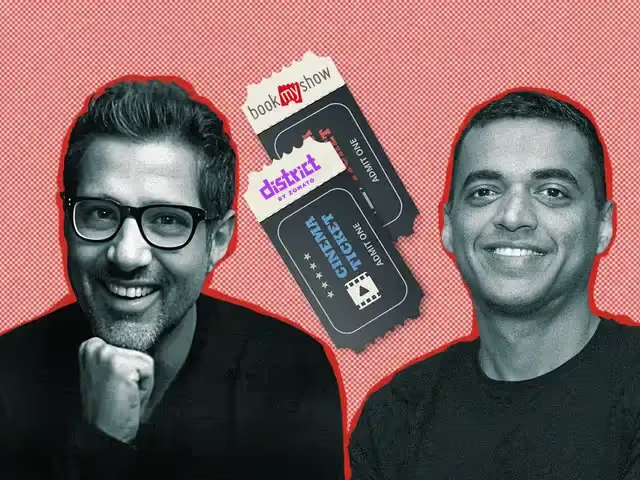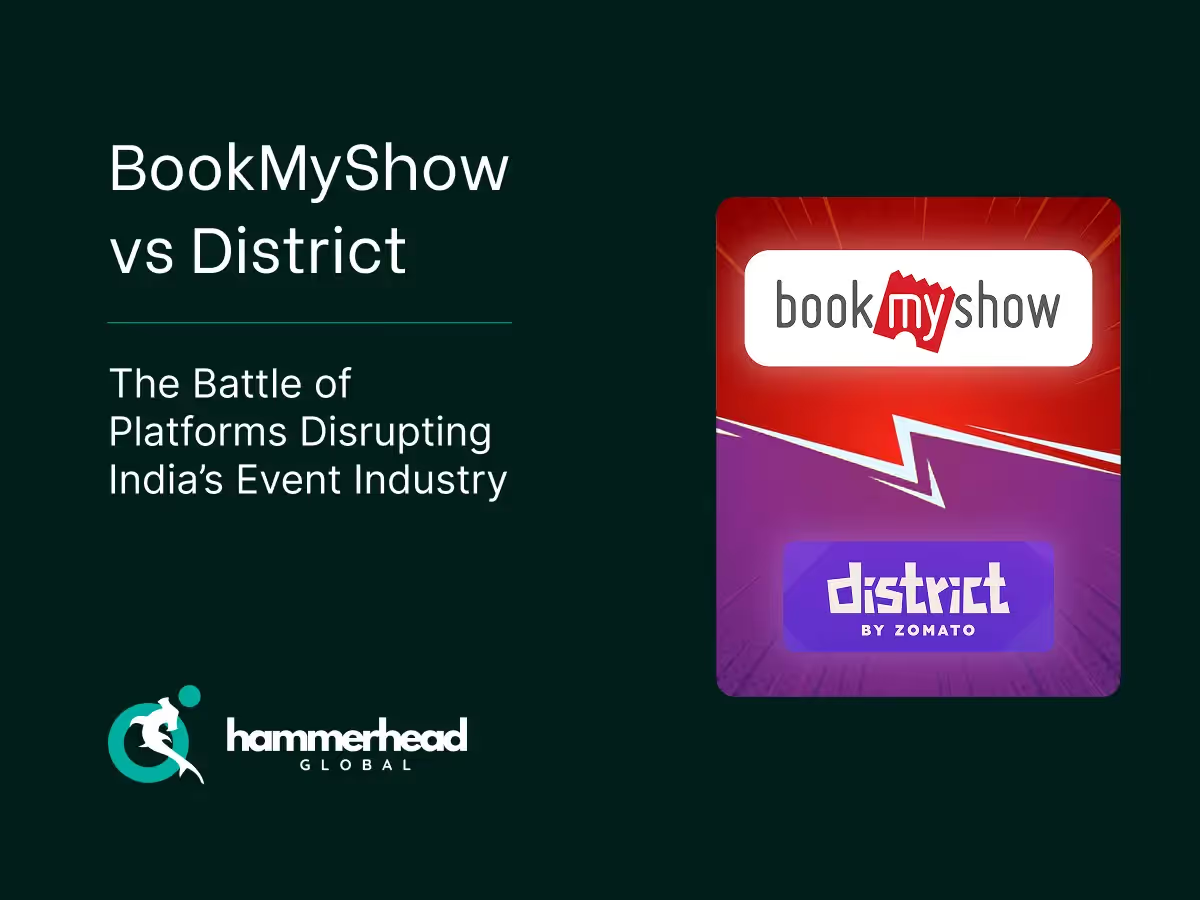India’s entertainment economy is evolving at breakneck speed, driven by shifting consumer preferences and the rise of digital-first experiences. In this rapidly changing landscape, BookMyShow vs District by Zomato represents more than a contest for ticket sales; it is a clash of two distinct philosophies on how to curate, package, and deliver immersive outings. BookMyShow, a pioneer whose roots in movie tickets date back to the era of dial-up internet, has steadily built a fortress of partnerships with multiplex chains, indie theatres, and live event promoters.
Meanwhile, District by Zomato emerges as the challenger, a platform that marries Zomato’s mastery of last mile logistics with on-demand discovery, blurring the line between dining, entertainment, and on-site service. Together, they are rewriting the rules for Indian event access, forcing the entire event management company ecosystem to up its game
Key Takeaways:
- BookMyShow’s legacy strength in cinema ticketing meets Zomato’s delivery-driven event model
- Innovations in imax tickets, subscription passes, and bundled food experiences signal new revenue engines
- The user journeys differ: one celebrates specialization; the other champions integration
- Legacy event management company structures are transforming under pressure from digital super-apps
- Future trends point to virtual-physical hybrids, loyalty subscriptions, and blockchain-secured ticketing
Origins and Market Positioning
BookMyShow launched in 1999 as India’s first platform for online movie ticketing, leveraging early partnerships with city multiplexes and independent screens. Over the next two decades, it scaled into concerts, sporting events, and immersive brand experiences, using proprietary technology to handle peak loads, Diwali blockbusters and a marquee Indian event such as the IPL season opener, with consistent uptime. Its brand equity became synonymous with ticketing reliability and a broad Indian event catalogue.
District by Zomato arrived on the scene in 2025 with a bold proposition: integrate ticket booking directly into India’s leading food discovery and delivery ecosystem. Rather than isolate events as standalone transactions, District positions them within users’ existing behaviour, ordering food, then layering on curated event suggestions, seamless checkout, and the promise of in-seat or at-home snack deliveries timed to showtimes.
One platform stands on decades of domain expertise, the other leverages a colossal user base and logistical infrastructure. Yet both aim to own consumer mindshare for anything worth stepping out of home to experience.
Core Offerings and User Experience

At the heart of the BookMyShow vs District by Zomato narrative is how each platform balances specialization with integration. BookMyShow’s dedicated interface focuses on precision, dynamic seat selection, tiered pricing for premium imax tickets, and real-time availability updates from partner screens. Its app integrates user reviews, sneak peek trailers, and loyalty rewards designed to keep cinephiles returning.
District’s approach folds events into a unified lifestyle super app. Movie lovers discover local screening schedules alongside restaurant recommendations, ticket checkouts automatically trigger in-app offers for combo meals, and here, users also seamlessly browse and book movie tickets within the Zomato app’s event tab. For festivals and live shows, District’s logistical prowess springs into action, coordinating QR-based entry and same-venue food pop ups powered by partner vendors.
Cross-Channel Consistency
BookMyShow maintains consistency across web and mobile with synchronized wishlists, push notifications for upcoming releases, and wallet integrations for faster checkout. District’s tie-in with Zomato means users experience familiar navigation, restaurant filters and order histories, now repurposed to surface events. Both platforms emphasize low friction, each click brings users closer to buy-in.
Promotional Campaign Integration
Both platforms leverage targeted promotional campaigns to boost user engagement and drive ticket sales. BookMyShow employs email blasts and app-based notifications tied to personalized viewing histories and upcoming blockbuster launches, often partnering with studios for exclusive early bird offers and loyalty rewards. District integrates promotional banners within the Zomato app, showcasing event bundles alongside trending restaurants and flash deals, thereby capitalizing on existing user traffic and purchase intent.
Loyalty and Rewards Programs
Loyalty initiatives serve as powerful retention tools for both services. BookMyShow’s loyalty program awards points for every ticket purchased, redeemable for discounted shows or partner merchandise. District’s model ties event participation to Zomato Gold membership perks, granting subscribers cashback on in-app orders during events and priority access to premium experiences. These rewards ecosystems incentivize repeat bookings and fortify the platforms’ positions as comprehensive lifestyle hubs.
Revenue Models and Monetization
Both platforms earn commissions on every ticket sold, but their ancillary revenue tactics diverge. BookMyShow monetizes through in-app ads, branded partnerships, and its growing streaming arm, which offers paid access to exclusive recordings of concerts and theatre productions. It also experiments with subscription tiers: a premium pass that unlocks discounted movie tickets and priority seating.
District by Zomato embeds event tickets within bundled culinary offers, ‘Dinner and Show’ packages that combine chef curated meals with VIP seating. It upsells limited edition merchandise and in event dining vouchers, leveraging Zomato Pay for seamless upsell during checkout. This synergy drives higher average order values and deepens customer lifetime value by capturing spend beyond ticket commissions.
A glance at upcoming pilots reveals BookMyShow exploring blockchain backed loyalty tokens, allowing patrons to trade or gift premium seats. District tests co branded merchandise drops timed to event launches, further boosting event management ROI.
Impact on Traditional Event Management Companies
The intensifying battle for digital ticketing dominance has rippled outward, compelling legacy event management companies to pivot. Many now integrate BookMyShow ticketing APIs into their own registration portals, supplementing in-person ticket windows with robust online sales. Simultaneously, they partner with District’s affiliate program to offer on-demand catering at corporate retreats and brand activations.
Traditional agencies from Hyderabad to Mumbai invest in white label mobile apps that mimic the user flows of these super apps, syncing event calendars with last mile food delivery. The result is a hybrid model, tech savvy event planners who can deploy quick registration microsites, real-time attendee tracking, and digital credentialing, all powered by back end systems inspired by BookMyShow and District.
Data Analytics and Personalization
Data lies at the core of both platforms’ growth engines. BookMyShow analyzes booking patterns, peak windows, genre preferences, demographic splits, to tailor marketing outreach and optimize capacity allocation. District merges order histories with event selections, using machine learning to recommend niche experiences: a midnight jazz brunch for offbeat music enthusiasts, or a boutique film screening paired with artisanal dessert deliveries.
Both companies harness real-time analytics dashboards that surface conversion drop off points, heatmaps of click behaviour, and retention cohort analyses. Their arms race in predictive modeling enables preemptive offers, say, sending discounted IMAX ticket bundles to users who show high engagement but low recent activity, ensuring their platforms remain indispensable.
Advanced AI-Driven Insights
Leveraging deep learning models, both platforms analyze vast datasets to uncover nuanced user preferences. AI driven analysis of session recordings, click paths, and past movie tickets purchases allows for hyper personalized event suggestions. These insights empower platform engineers to refine recommendation engines continuously, ensuring each user’s discovery experience feels bespoke and relevant.
Predictive Demand Modeling for Peak Events
By combining historical booking data with real-time social media sentiment and regional calendar events, predictive models forecast demand surges for major releases and festivals. BookMyShow uses these forecasts to adjust pricing for premium formats like IMAX tickets, while District allocates additional delivery resources to food partners during high traffic shows, enhancing customer satisfaction and reducing last minute service failures.
Customized User Segmentation and Lifecycle Tracking
Sophisticated segmentation strategies group users by engagement level, genre affinity, and purchase frequency. Platforms track these segments through defined lifecycle stages, from first time Indian event explorer to seasoned attendee, delivering targeted communication at each touchpoint. Customized newsletters, in-app notifications, and exclusive presale offers reinforce loyalty and drive repeat purchases, demonstrating the strategic value of integrated event management company data practices.
Future Trends and Strategic Directions
As BookMyShow vs District by Zomato vie for leadership, emerging technologies will redefine user expectations. Augmented reality seat previews may become standard for imax tickets, letting audiences visualize screen angles before booking. Blockchain secured tickets, complete with embedded smart contracts, could eliminate fraud and enable royalty sharing for creators.
Look for integrations with travel apps, ticket plus stay packages, and subscription models that bundle unlimited event access with curated dining experiences. Sustainability will also shape strategies, carbon neutral ticketing options and alliances with local environmental initiatives may become differentiators.
The true battle will be who can deliver the most seamless, sticky ecosystem, one click saves of favourite venues, unified loyalty programs across entertainment verticals, and AI driven concierge services that coordinate everything from car rides to backstage passes.
Conclusion
The clash of BookMyShow vs District by Zomato illustrates the future of India’s entertainment economy, a world where content, commerce, and logistics converge under unified platforms. BookMyShow’s seasoned infrastructure and deep event roster collide with District’s delivery-driven, lifestyle-focused model.
The competition elevates consumer expectations and drives innovation across ticketing, dining, and experiential services. Both platforms prove that whether it’s movie tickets or a full-fledged indian event package, the battle for consumer mindshare is only heating up.
FAQs
What sets BookMyShow apart in the Indian market?
BookMyShow’s longevity and deep partnerships with cinemas and live-event promoters give it unparalleled reach and reliability in movie tickets and immersive experiences.
How does District by Zomato integrate food into its event offerings?
District leverages Zomato’s logistics to bundle curated meal plans, in-event snack deliveries, and post-show dinners, creating holistic Indian event experiences.
Can I purchase imax tickets on both platforms?
Yes. BookMyShow supports premium formats like IMAX and 4DX, while District offers IMAX booking within its Zomato app, often paired with exclusive F&B deals.
How are traditional event management company models evolving?
Legacy firms now adopt white-label apps and integrate ticketing APIs to match the seamless booking and on-site service levels set by these digital platforms.
What innovations lie ahead in platform ticketing?
Expect AR previews, blockchain-secured NFT tickets, subscription passes, and integrated stay-and-dine packages to become hallmarks of the next-generation entertainment ecosystem.



.svg)